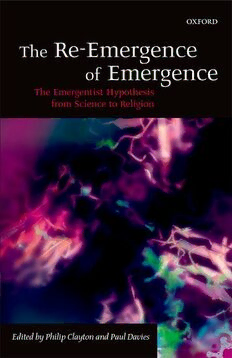
The reemergence of emergence: the emergentist hypothesis from science to religion PDF
345 Pages·2006·3.743 MB·English
Most books are stored in the elastic cloud where traffic is expensive. For this reason, we have a limit on daily download.
Preview The reemergence of emergence: the emergentist hypothesis from science to religion
Description:
• Offers an authoritative introduction to the entire field of emergence studies• Presents the most recent literature and conclusions, in a thoroughly readable style• Bridges the classical divide between the "two cultures" of the sciences and the humanities and engages the growing field of science and religionMuch of the modern period was dominated by a "reductionist" theory of science. On this view, to explain any event in the world is to reduce it down to fundamental particles, laws, and forces. In recent years reductionism has been dramatically challenged by a radically new paradigm called "emergence". According to this new theory, natural history reveals the continuous emergence of novel phenomena: new structures and new organisms with new causal powers. Consciousness is yet one more emergent level in the natural hierarchy. Many theologians and religious scholars believe that this new paradigm may offer new insights into the nature of God and God's relation to the world.This volume introduces readers to emergence theory, outlines the major arguments in its defence, and summarizes the most powerful objections against it. Written by experts but suitable as an introductory text, these essays provide the best available presentation of this exciting new field and its potentially momentous implications.
See more
The list of books you might like
Most books are stored in the elastic cloud where traffic is expensive. For this reason, we have a limit on daily download.
